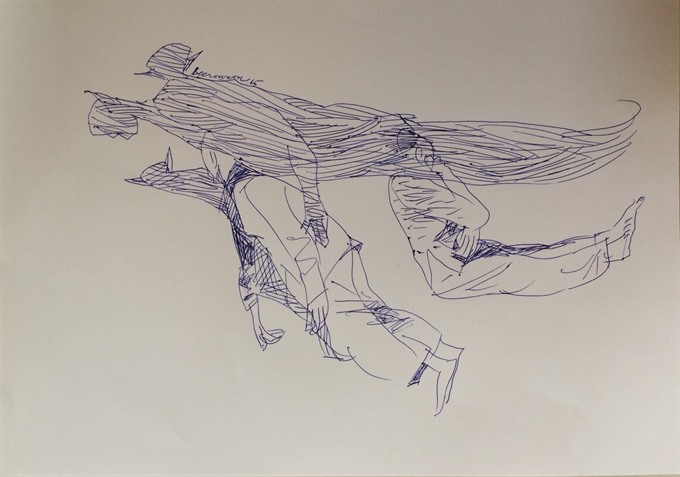

A short story by Nguyễn Thị Việt Hà
 |
by Nguyễn Thị Việt Hà
“We’d better not see each other anymore,” Dung said to Cường, her boyfriend. “But it isn’t goodbye for good. Just a temporary separation. Whenever, we need each other, we’ll come together again,” she said.
“If we do this we might not see each other for a long time, or never again!,” he wailed.
“No problem, my dear!” she said, looking into his eyes. “What’s the use of clinging to each other when we don’t seem to want to be together,” she tried to comfort him.
He had never understood her completely. In his mind, she had been an evergreen luxurious island with a cosy warm nest inside and now was a vast burning desert.
The first time they met was on a bus, when she hurriedly got on and saw him sat on his seat. Coming close to him, she lightly patted him on the shoulder and boldly asked, “I’ve just run all the way here to arrive get to the station in time. My legs are exhausted. Would you mind giving me your seat, please?”
“With pleasure, lady!” he had planned to stand up when she walked over anyway. “Thank you very much. I’m Dung, I’m new to the city,” she introduced herself with a broad smile and a mischievous glance.
* * *
Sài Gòn had never been as good a place to live as was imagined. Dung was worried when she first arrived. At the age of 18 she left the western city of Cần Thơ for Sài Gòn for university. At first, she found it difficult to fit in with the city, where she had nothing to remind her of home. She did not like the crisscrossed, chessboard-like streets. She was confused about which exit to take from roundabouts. Sometimes, she felt it hard to breathe amid the crowds, especially in traffic jams.
Not until her fourth year in Sài Gòn was she accustomed to its energetic tempo, to the point where she did not want to return to her hometown. She worked as a minor editor for a renowned publishing house. The pleasure of a fully-equipped flat and an intense relationship made her forget her homr. Besides, Sài Gòn life was so busy that she had no time to be nostalgic. She was even unaware of the changing of the seasons.
* * *
As he was in love with Cường, she couldn’t tell if their love was real or fake. They took the same bus for a year, with their connection sparked by him giving seat to her for the first time. From then on, he always sat on the same seat and yielded it to her. Soon they fell in love with each other. “When did he express his love to me?” she asked herself but she could not remember. “It doesn’t matter, because I need a shoulder to rest on, and he wants a soft hand to ease his pain,” she whispered to herself.
Dung thought that when a couple was in love, their first time discovering each other’s bodies would be important and inticing. For her, it felt like work and as if she was being watched, under pressure. Time and again, she tried to remember it fondly to relax after a long day at work. “Love is nothing but a dream that people imagine and embellish with a magic palette of colours,” she said to herself. For young people like Dung, they had no time to indulge the hallucination of love.
To Dung, Sài Gòn was an urban centre where a stylish life was a must. Cường told her that he was very fond of girls from the western region of South Việt Nam. “In general, they are impartial, unaffected and bright,” he remarked. Those days, she believed that everybody she met was a good person. Being timid and reserved, she did not like artificial and unpractical things.
As for Cuong, the Dung of yesterday was lovable. He remained in love with her. But he did not want a fashionable girl who could drink whiskey, frequent dance halls and sway her hips madly to throbbing music. Sadly, the Dung of today was not herself any more. She ignored Cường’s wishes. Sài Gòn was one of the world’s paradises, yet it was also hell on earth.
“The Dung you remember belongs to the past,” she told him one day.
“Why is that?” he asked her. She stayed silent, giving him a challenging and mocking glance. He was crestfallen. He felt like she was crushing his heart with her hands. She left him alone with his despair. Her strange behaviour came from her mother’s annoyances and irritations at her father’s gradual abandonment of his wife and child.
* * *
Dung parents’ house was situated near Bình Thuỷ Bridge, where she ran a noodle stall named after her daughter, Ngọc Dung, and where her husband was a hired barge driver. He spent less time on his proper job than carryinh Mrs Tư and Mrs Bẩy, the widowed women in the area, across the river. Dung’s mother knew of his infidelity, but she was not jealous of his wicked conduct. Neither was she angry with him. She had her hair cut short to pray for his repentence and kept working the stall to support the family. “Why haven’t you punished those bitches?” Dung asked her mother.
“What for, my dear? Your Dad will return home when he grows tired of them. It’s all his fault,” she replied.
Dung’s mother did not ask her to follow the traditions necessary for a girl before marriage. “Virginity and moral conduct of a bribe-to-be are counted only from the day she becomes a wife,” she taught her daughter.
* * *
Dung’s father often returned home when he was drunk in defiance of his wife’s resignation and his daughter’s indifference, which came to her almost unnoticed day after day. Dung regarded them as having nothing to do with her. If any sadness came to her, it was because of her mother’s fate as a quasi-servant in her own home.
Dung was in her eigth year in Sài Gòn. Not much had changed, except for her short love affair being over, deep homesickness and boredom at work.
What stayed fresh in her heart was the moments when she was beside her beloved mother and when she buried her head inside her mother’s hair. When Dung was seventeen years old, her hair was already knee-length. After her one-year stay in Sai Gon she had it cut for money to pay for her rent. Afterwards, she burst into tears when she reached her condo. Dung knew that her mother’s hair was buried in the garden, hoping it would inspire her husband to turn over a new leaf, while Dung’s hair was cut due to her lack of money.
* * *
Early one morning Dung’s phone rang. Her father informed her that her mother was seriously ill and told her to come home as soon as possible.
“Why didn’t you tell me as soon as she fell ill?” she asked her father.
“Because your Mum didn’t want to disturb your studies. As soon as I found out it was serious, I picked up the phone and called you,” he answered.
Dung asked the university for leave. She hurriedly packed her bag to go home.
When she got home, her mother had already died.
“When you hung up on me, she breathed her last. Before that, she told me to dig up her lock of hair from the garden and put it in her coffin,” he told Dung as he choked up.
Dung, with trembling hands, lifted the lock of hair which had been carefully wrapped in layers of cloth by her mother before she put it in a wooden box, as if it was a funeral rite. To her surprise, it was still shiny and fragrant after having been underground for years. She pressed it to her chest and then placed it on her mother’s side. Her father looked at the sacred hair respectfully. For the first time ever, Dung saw him kneeling down, holding her cold hands and mumbling prayers asking for forgiveness. Dung though her mother looked at peace.
Dung thought that she did not need to leave her mother’s house in Cần Thơ after settling down in Sài Gòn for eight years. Although the Hậu River sometimes rumbled violently, it remained tolerant towards those who wished to return like Dung and her father.
Suddenly, her mobile phone rang loudly. She picked it up.
“After looking for all over Sai Gon for days, I heard about what happened. I’m on the way to Cần Thơ. Stay strong,” Cường said in a moved voice.
Dung burst into tears while her hair turned tousled. Amazingly, her previously short hair grew quickly.
The waves under the Bình Thuỷ Bridge lapped gently. Dung’s father held his hands tight over those of his ill-fated better half.
Translated by Văn Minh









